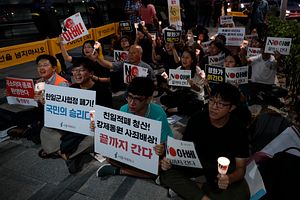For months, South Korea and Japan, two of the United States’ top Asian allies, have been embroiled in a bitter political spat over a controversial South Korean Supreme Court decision that ordered Japanese corporations to compensate Korean forced-labor victims from World War II. But South Korea’s recent move to scrap the General Security of Military Information Agreement (GSOMIA), a military intelligence-sharing pact with Japan, came as a surprise even for the United States, dealing collateral damage to the cohesion of the U.S. alliance architecture in Asia. “Very disappointed” were the words of U.S. Secretary of Defense Mark Esper in a rare public rebuke of Seoul. “We were not forewarned,” added Randall Schriver, the assistant secretary of defense for Indo-Pacific security affairs.
But liberal South Korean President Moon Jae-in’s decision to repeal GSOMIA is less surprising in the context of his domestic political agenda and a dramatic personal rivalry with the conservative leaders who inked the agreement.
GSOMIA, the bilateral pact signed between Seoul and Tokyo in November 2016, was touted by Washington as a crucial software update to the “hub-and-spokes” model of the U.S. alliance system in Asia, with the United States as the “hub” in a network of bilateral alliances including South Korea and Japan. By allowing Seoul and Tokyo — the “spokes” — to bypass the “hub” and share military intelligence directly with each other, GSOMIA had enabled seamless surveillance on North Korean missile activity while symbolically consolidating U.S. trilateral pressure on China.
But in the Korean psyche, the specter of “Lee-Myung-Park-Geun-Hye” — a popular phonetic jab at the contiguous reign of conservative Presidents Lee Myung-bak (2008-13) and Park Geun-hye (2013-17) — hangs heavily over GSOMIA and its controversial history.
In June 2012, President Lee Myung-bak attempted to pass GSOMIA furtively in a backroom meeting with his cabinet to circumvent anti-Japanese opposition from the National Assembly. The cabinet approved and formally unveiled the agreement to the public on June 28, one day before it was supposed to be signed. But the surprise announcement instantly provoked the ire of the National Assembly and public, leading to the resignation of two high-ranking officials including a senior presidential secretary. GSOMIA was ultimately abandoned at the 11th hour to appease public anger, with less than an hour before signing. Current President Moon, at the time, denounced the secretive pact, vowing to repeal it as president if the agreement managed to squeak through.
And four years later, GSOMIA did squeak through, under the auspices of President Park Geun-hye. In 2016, Park found herself in the midst of a massive political scandal that would ultimately lead to her impeachment. While millions of South Koreans took to the streets to demand her resignation, GSOMIA quietly whisked its way to approval in a closed-door cabinet meeting on November 22, 2016 and was signed immediately into action the following day. It was largely seen as a final act of defiance and diversion attempt by an embattled president who would be suspended less than three weeks later. “Traitorous,” Moon’s Democratic Party said of Park at the time.
It remains an open secret in Korean politics that Lee and Park are sworn personal enemies of current President Moon. Park, for one, defeated Moon in the 2012 presidential elections. Lee, on the other hand, is widely blamed by the Korean left for the “political murder” of disgraced liberal President Roh Moo-hyun (2003-08) who jumped off a cliff in 2009 when a special prosecution ordered by Lee pressed corruption charges against him. Moon, who served as Roh’s chief of staff, had been a close friend, confidante, and business partner to Roh since the 1980s. In his autobiography titled Fate, Destiny, and Moon Jae-in, Moon recounts the anger he felt toward Lee over the suicide of his dear friend Roh and calls Roh’s death the burden that “fated” him to run for president.
And in 2017, Moon finally achieved this fate on the heels of the impeachment scandal that left the conservative dynasty of “Lee-Myung-Park-Geun-Hye” in smoking ruin. In the absence of conservative solidarity, the liberal Moon Jae-in rose to power as the standard-bearer for a nationwide movement to “cleanse” the country of corruption and pro-Japanese influence. Under Moon’s presidency, the impeached Park was arrested and sentenced to 25 years in prison on bribery charges. Meanwhile, the controversial agreement Park forged with Japan on comfort women in 2015 was predictably repealed under Moon’s watch. Lee, too, was arrested and sentenced to 15 years under the probing investigation of Moon’s justice department. Lee, now 77 years old, has vehemently accused Moon of “political retaliation for the death of [former President] Roh Moo-hyun.”
It is important, of course, to understand GSOMIA’s cancellation primarily through the prism of South Korea’s current spat with Japan and its broader effect on the American alliance. But GSOMIA remains an iconic vestige of a conservative era that is domestically associated with corruption and lack of transparency. The shadow of Moon’s own political rivals, who now face the rest of their lives in jail, lingers heavily over the agreement. It is, perhaps, little surprise that when the opportunity finally presented itself, Moon relegated this pact to the same fate that befell his enemies.
Brian Kim is a J.D. candidate at Yale Law School, where he is a Kerry Fellow, an editor of the Yale Law Journal and Yale Journal of International Law, and on the board of the Paul Tsai China Center and Yale Law & Business Society.

































